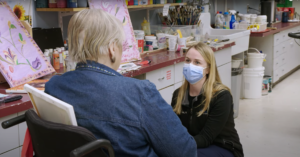With short-term funding from the Strengthening a Palliative Approach-Long-term Care project and BCCPC, Della Roberts convened a group of representatives from BC’s long-term care (LTC) community to explore opportunities to work together to strengthen a palliative approach to care in LTC. Leaders in LTC across the BC health authorities formed a collaborative to enhance the integration of a palliative approach that is already happening but also to generate new integration strategies and spread the approach to more LTC homes in BC.
“For the best results, we needed representatives from as many health authorities as possible, and from health authority and Affiliated (contracted) long-term care homes,” says Della. “It was gratifying to see the response to our invitation – we obviously tapped into a need in the LTC community.”
One of the people who answered the call was Frances Wright, Palliative Outreach and Consultant Team Nurse, Providence Health Care. Frances talks about her experience in LTC, and how the collective effort of the LTC Collaborative can make a big impact for people in BC.
In an LTC landscape where people are entering the homes at a later stage in their disease and higher acuity, Frances has seen the increasing need for a consistent use of a palliative approach to care.
“The LTC Collaborative had an in-person meeting in February, which had people attend from all across BC. It was so inspiring!
Making connections, getting to know colleagues from other regions, learning about each others’ challenges and triumphs … I came away fulfilled and energized to keep going!
This group has inspired me to aim higher, and to persevere. It reinforced my belief that a palliative approach to care is the bedrock for an improved experience for residents, their families and staff.”
– Frances Wright, Palliative Outreach and Consultant Team Nurse, Providence Health Authority

“Whenever there is a change in a person’s health – we call these signposts – it’s an opportunity to reengage with people and their families,” says Frances. “Engaging at significant signposts gives us the chance to provide a consistent palliative approach to care and gives the people and their families the chance to be informed and prepared for the decisions to come.”
Before the LTC Collaborative was formed, clinicians across the province were undertaking their own projects, either for individual homes or for their health authority. And while these projects yielded benefits, working together on a province-wide scale is a pathway to making a deeper – and more sustainable – impact for families in BC.
One of the projects that has come out of the collaborative is identifying the essential elements for a palliative approach in LTC (such as having conversations at health signposts, engaging in advance care planning and serious illness conversations, and optimizing comfort).
“It’s energizing to be doing this work for the collaborative,” says Frances. “Working together, we can give this work the strong voice it deserves. Collaborations like this are pathways to making a real impact at a provincial and policy level.”
“The genius of the LTC Collaborative lies in the passion and collective energy of the participants.”
– Della Roberts, Special Projects Manager, BCCPC
Despite the documented evidence of the benefits of a palliative approach to care – among them better-managed symptoms, more satisfaction with care from both patients and families, and in some cases, patients living longer and more comfortably – a palliative approach is not applied uniformly across the province.

“The truth is, we know the benefits of a palliative approach to care for residents and their families, yet we’re missing lots of opportunities to engage them in important conversations,” says Frances. “The approach can vary from home to home and from healthcare provider to healthcare provider.”
The key, according to Della Roberts, lies in collaboration and education:
“A palliative approach to care is ultimately a team approach – anyone, from any discipline, can have these important conversations – and one way to make that happen is to equip each team member with the confidence that comes with education.”
Della is careful to point out that the final products from the LTC Collaborative will be a group effort based on consensus.
“We at the BCCPC are the convenors; we bring together people with expertise and lived experience to find ways to facilitate, innovate and make change happen,” says Della. “The genius of the LTC collaborative lies in the passion and collective energy of the participants.”

